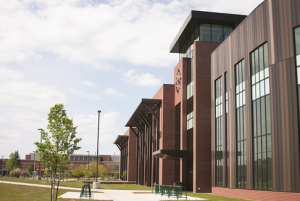Senior business major Kacy Gould was excited to return to her Illinois home last summer after classes ended. Her excitement mirrored many students who were ready to relax for the summer recess.
Gould did not spend her summer relaxing by the beach, though. Instead, she was one of the 2,454 students enrolled in a summer course through NMU. Gould has taken summer courses frequently.
“The only reason I haven’t taken summer classes every summer is because I work extensively in the summer to save for fall and winter classes and living expenses so I don’t have to work as much throughout the year and get distracted from my studies,” Gould said.
NMU students take an average of five years to graduate and, historically, only about 30 percent of students enroll in summer courses compared to the previous fall semester, according to records from the registrar office. Students utilize summer course offerings to graduate early or play catch up after dropping a class during the regular year, but the majority of NMU students who don’t take courses tend to focus on jobs and fear the accelerated rate of online courses, which are a common occurrence on campus.
NMU will offer 274 courses this summer, not including 18 study abroad blocks. Of these 274 classes, 139 are web-based and 131 are on-campus courses, according to the registrar office. Of these 131 classes, 51 are labs, 5 are field classes or internships and 21 are practicums, meaning 59 percent of the offered on-campus classes have to be on-campus because of lab-related criteria giving a technical total of 53 classes offered on-campus that are purely in the classroom.
Over the last five years, departments have moved courses to an online format, a decision made by each individual department, Assistant Provost for Undergraduate Programming and Faculty Affairs Dale Kapla said. According to Kapla, the departments have to ensure faculty members are willing to move to an online format.
“Students like to go home for the summer because they have jobs and they don’t necessarily want to pay rent when they can live with their folks,” Kapla said. “So rather than stay for the summer sessions, they can go home and play catch up there.”
The summer sessions are broken into two separate six week periods, giving the courses an accelerated component since 15 weeks of information must be shrunk into six weeks. The first session starts on May 18 and the second starts on June 29. Kapla said he worries that students will get lost in the accelerated pace of online courses and not do as well as they may have if it was offered on campus.
“I remember when I was in college, I took a summer class. It was too much,” Kapla said. “I mean I did okay in it, but it was just too much. I would have preferred a slower pace.”
Gould said she highly recommends summer courses, but suggests taking an on-campus class or taking an online course during the regular school year in order to get used to the online format. There’s also the fallback of a larger teacher availability in case questions cannot be answered through email if taken during the school year.
“If it’s not one of your strongest subjects or you don’t have a strong interest in it, don’t take it online,” Gould said. “Depending on the type of student you are, online courses can encourage procrastination and a relaxed attention to the class.”
An online competency tutorial was enacted in recent semesters and must be completed by students and faculty who have not been through an online course, said Kapla.
Other faculty members like online courses for a variety of reasons including the flexibility it provides to working students. According to survey results, 70 percent of NMU students are working, and of that 70 percent, 40 percent are working 25 hours or more, criminal justice department head Charlie Mesloh said.
Mesloh, Kapla and several other faculty members agree that summer classes are useful from the administrative point of view when it comes to the state legislature observing the time to completion rate. The more summer courses taken, the lower the time to completion rate is, which reflects positively on the school to prospective students and their parents, Kapla said. For the students, the less time it takes them to graduate, the less debt they accumulate.
“It is the professor’s’ job to instruct to the best of their ability,” Mesloh said, “but it’s the department heads job to make sure students are getting out of here in a timely fashion.”

























